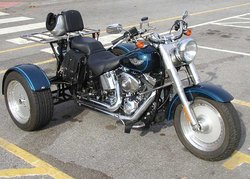Tricycle
|
|
A tricycle is a three-wheeled vehicle. Often they are human powered, similar to a bicycle, but with three wheels. There are also motorized tricycles, similar to motorcycles (however, sidecars are not considered tricycles, neither are the three wheeled automobiles such as the Morgans). Tricycle is commonly shortened to Trike.

These wheels can be arranged either with one steering in front and two parallel behind (delta), or with two steering in front and one behind (tadpole). Occasionally, rear wheel steering is used, although this increases the distance needed to initiate a turn. (The proper geometry is just like a regular trike operating in reverse, but with a steering damper added.) Either kind can be made low and large enough to be impossible to overturn on dry pavement, but usually, the rider is high enough that tipping is possible, especially if the rider does not lean into the corners on a pedal trike. This shows up the big difference between tadpoles and deltas. When you use the brakes, a tadpole becomes both more stable, and more likely to slide instead of roll. In contrast, a delta with the front brake on hard must go almost straight ahead to avoid tipping. Insurance rates reflect this. The other difference is that, what with all the roll resistance being at one end, tadpoles always understeer, and deltas always oversteer.
In the case of delta tricycles, the drive is often to just one of the rear wheels, though in some cases both wheels are driven [two-wheel drive] through a differential or the superior double freewheel, preferably using no-backlash roller clutches. Longstaffs, Higgins and Pashley are the principal makers of 'delta' pattern upright trikes in the UK. Most tadpole trikes drive their single rear wheel.
Small tricycles are often used by children. They are easier to ride than two wheel bikes due to not requiring the ability to balance. Adult tricycles are much less popular than bicycles, and adults often find tricycles difficult to ride, even in a straight line on level ground, due to their familiarity with the counter-steering required to balance a bicycle. The variation in the camber of the road is the principal difficulty to be overcome once basic tricycle handling is mastered. Recumbent trikes are less affected by camber and,depending on the riding position, capable of very fast cornering. A few trikes are designed to tilt into the corners much as a bicycle does, and this also renders them more comfortable on cambered roads. They are discussed as tilting three wheelers, or TTW's for short.
Some tricycles are suited for load carrying, others are designed for racing or for comfort. Some forms of recumbent tricyces are fully enclosed for all weather use. These are known as velomobiles. Other designers try to reduce the number of parts, especially specialty ones, to a minimum, and these can require some major skills in extreme conditions that a velo would laugh at.
Due to the ease of fitting standard bicycle brakes, recumbent trikes often have the ability to brake just one side, like a farm tractor. This has led to a specialized geometry, grossly misnamed as center point steering, which really refers to a kingpin axis intersecting the ground directly ahead of the tire contact point, producing a normal amount of trail. This arrangement, elswhere called "zero scrub radius" is used to mitigate the effects of one-sided braking on steering. It is said to let some riders hold rigidly to their twitchy, bike-quick steering grips (while leaning!)and steer by braking. At least, braking the inside tire will warn you it is getting light with only half the loss in momentum of braking both for an equal warning margin. Zero scrub is generally avoided on the grounds that it reduces steering feel and increases wandering, although it is also approached on powerful FWD cars to keep steering efforts reasonable.
In the UK, upright tricycles are sometimes referred to as "barrows". Many "trikies" in the UK belong to the Tricycle Association, formed in the 1929, and take part in its day rides, tours and time trials. Massed start racing of upright tricycles is limited to one or two criteriums such as in Bungay, Suffolk each year. Contrary to popular belief and cycling legend, it is not essential to be bearded to be a trikie.
